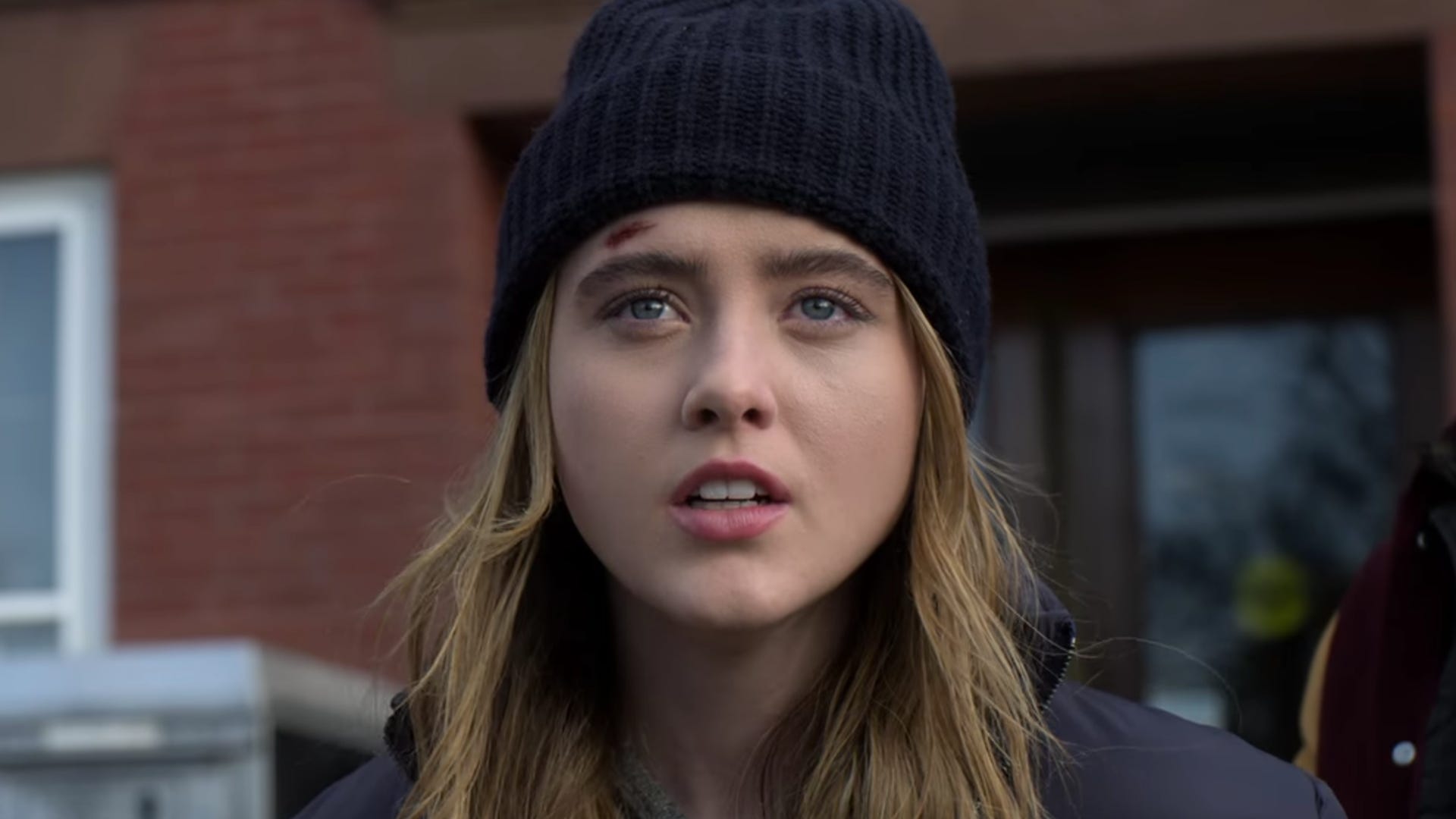Join or Sign In
Sign in to customize your TV listings
By joining TV Guide, you agree to our Terms of Use and acknowledge the data practices in our Privacy Policy.
The Society Creator Answers All Our Burning Questions — Including What Comes Next
And yes, we'll learn more about how they got to New Ham soon
[Warning: The following contains spoilers for The Society.]
If you're anything like us, then you've already finished The Society, the latest teen drama from Netflix. Kathryn Newton stars in the addicting thriller as Allie, one of many teens who find themselves mysteriously taken to an exact replica of their Connecticut town -- only their parents are gone, and so is everyone else.
Throughout the 10-episode first season The Society's focus wavers between the socio-political drama as Allie attempts to build a functioning new world and the supernatural mystery of how these 200 or so teens got transported to a parallel universe -- by bus no less -- and why they were taken to New Ham to begin with. TV Guide spoke to creator Christopher Keyser about all of the biggest twists and lingering questions, including what fans can expect of a potential second season. Check out everything he revealed in our interview below!
Now that Allie and Will (Jacques Colimon) have been locked up and Campbell (Toby Wallace) is in a position of power, how much danger are they really in?
Christopher Keyser: I think the show suggests that it could be really serious danger. After all, it would not be entirely outside the realm of what even Allie and Will had decided they needed to do in terms of consolidating power. I think the show suggests that people are willing to go to pretty dark places in order to protect themselves. I'm not saying that's going to happen, but I don't think anyone should feel like anyone is safe.
The Meanings Behind 16 of The Society's Most Essential Cultural References
Although Lexie (Grace Victoria Cox) and Harry (Alex Fitzalan) are co-mayors, Campbell has leverage on both of them. How will that dynamic play out moving forward and will anyone actually be able to maintain any control over New Ham?
Keyser: I think that's actually really the point. That's what I'm really interested in. I'm interested in the idea of this triumvirate, none of whom really trust the other two entirely, and they have good reasons not to. And yet somehow, together, they've got to make decisions. And it's true that making decisions can be dangerous, but it's also true that not being able to make decisions, particularly in light of everything they're going to face -- the winter and the requirements that they begin to produce their own food -- I think that's the real question, as to whether they can do that and whether they turn against each other or [if] there's a kind of a gridlock there. It's a little Roman to have these triumvirates of power and you can't tell who's going to turn on whom.
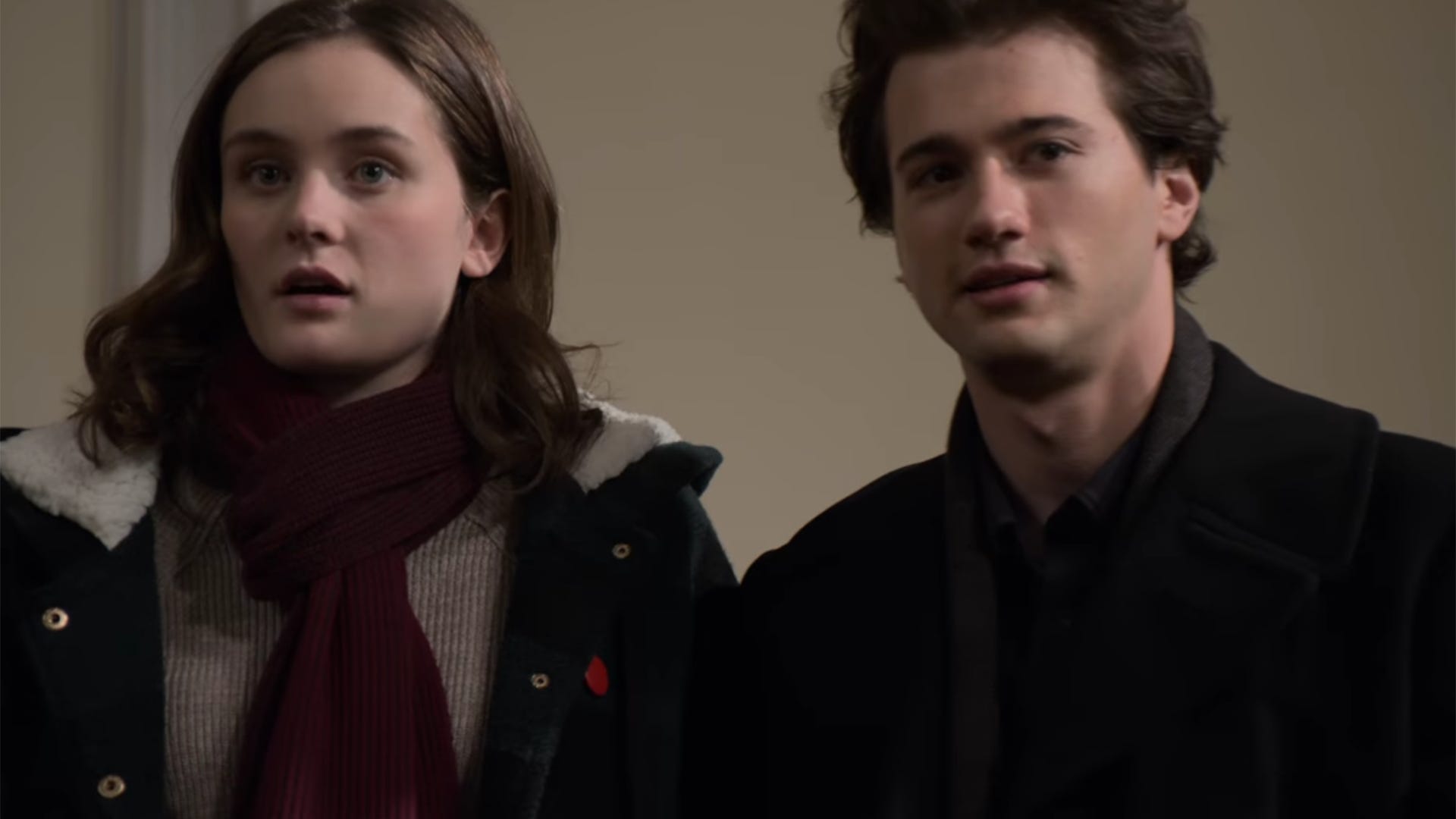
We didn't really learn too much about where New Ham is or how the kids got there this season. Did you purposefully want to hold out on revealing too much too early?
Keyser: It's going to stretch out over the course of, if we're lucky enough, a reasonably long series of stories [and] seasons of the show. But yeah, there are lots of questions still left to be answered. I think you're beginning to get hints because the story of what happened that you saw in the first episode, about the way in which that smell, the bus driver, and all that are connected. But the question of what the crimes are of West Ham and what that means, and whether those kids are being punished or saved, or exactly how they could get back or if they ever will, those things are all questions that will get played out over time. ... There are deep levels to those mysteries but these kids have a lot on their plates in addition to trying to figure out what exactly happened to them.
Are you planning on providing answers to all the questions eventually or will some things be left more ambiguous?
Keyser: It's hard to say. We have answers to the questions. Whether we decide at some point, for dramatic purposes, it's more interesting for the kids to be, not entirely in the dark but not entirely certain either. ... Certainly, I think the signs of [how they got there] will always be somewhat opaque to them, even if they can figure out how that might get reversed or if it might ever be reversed. Those things aren't easily revealed. But we do have a sense of where we're going and it's not to keep anyone in the dark entirely. I don't know yet. Some of this ... is that the fun is in exploring it as it goes along. We have a very clear plan going forward, but we're also flexible enough to say, "What shows up along the way that's really interesting?" And that diverts us for a while. "Where did we not expect to spend so much time but we're going to?"
The Society Review: The Mysterious Thriller Is Netflix's Best YA Drama Yet
Is there anything you can say about Pfeiffer's role in all this, and how the smell might be connected to what brought them to the new world?
Keyser: I prefer not to do too much of that. Those who recognize the Pied Piper element of this -- a town that has a problem, hires somebody to take care of it and refuses to pay, and it loses its children -- it's not a story that we push forward; that is for a viewer to either know or not know. But the question of whether that smell is just literal or metaphorical for something else is a thing that we're going to explore. We know that there was a thing and that they did renege on a contract. The question "would you be punished for reneging on a contract or not?" is exactly the question that all of our citizens deal with. But I think there's more than a possibility that that smell is both literal and metaphorical.
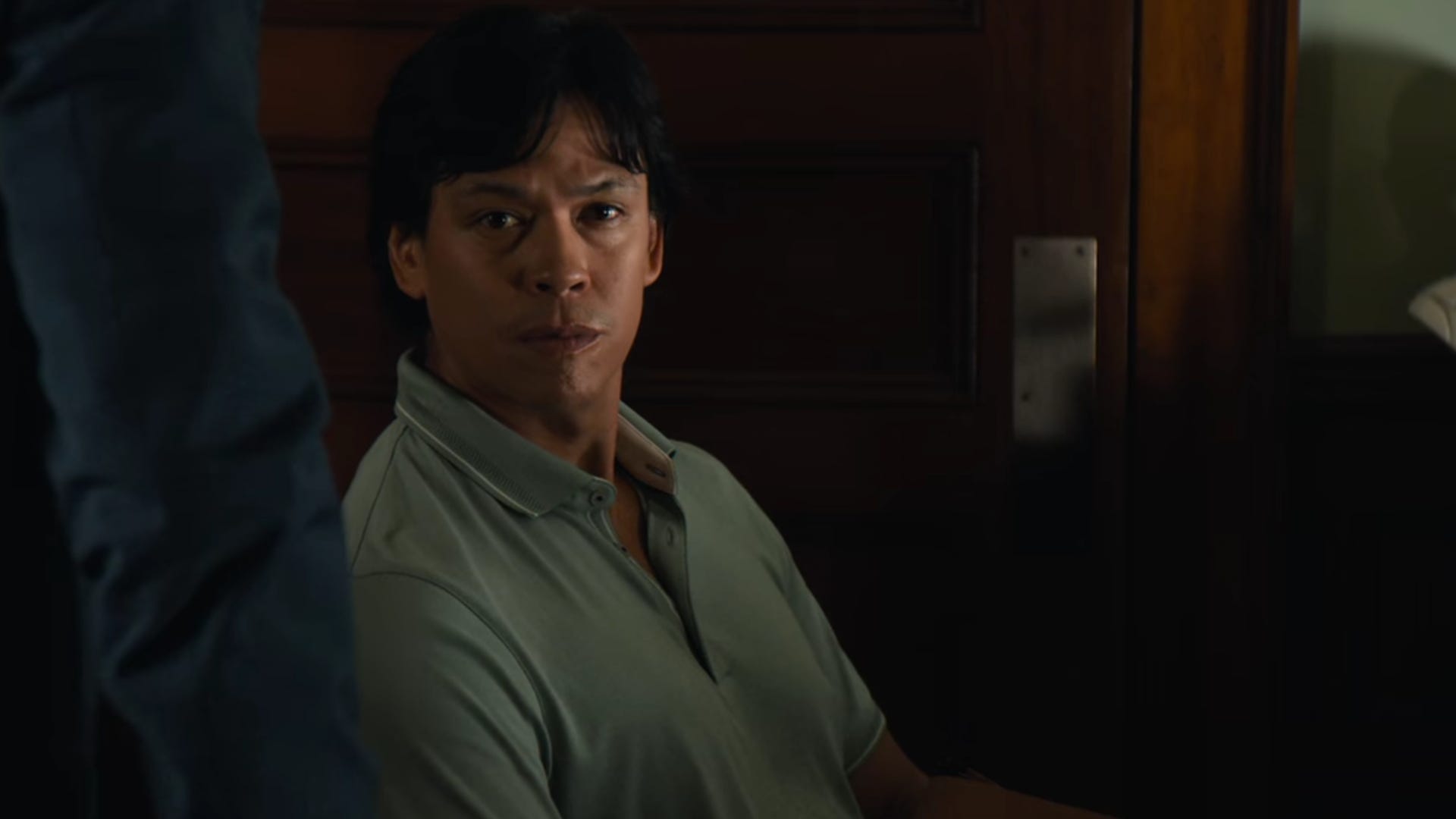
When Sam (Sean Berdy) and Campbell find the broken contract with Pfeiffer, they say it was signed by their dad and Uncle Rogers. Does that mean Cassandra (Rachel Keller) and Allie's parents were involved directly in what seemingly was the catalyst to this entire situation?
Keyser: Well that's something that you're going to explore a little bit more because there are some family dynamics there. And Cassandra and Allie's mom, who's related to that family, is in some ways meaningfully different from either Campbell and Sam's parents or Harry's mom, all of whom have a certain social class in the community. So class will come into play there again in a way. I can say that. So whether they are involved or whether they are on the other side is one of the questions that we will explore.
The dog Campbell kills was also at the scene of Cassandra's murder and then we see it again in West Ham outside the Peter Pan reading. Right now, the dog is the only thing we've seen that exists in both worlds. What can you say about the significance of the dog and what all of its appearances mean?
Keyser: I think I can say that it means something that it appears in both places and that we're not clear about whether it's alive or dead in the world from which Elle and Campbell exist in. ... I don't want to give that away because I think that's one of the clues and I didn't want to unravel it entirely too soon. But it is certainly meaningful. That is not without a point.

The finale posed the interesting question that the kids might actually be the ones who were saved. What can you say about introducing this alternate perspective at the end of the season and how that question will continue to be explored?
Keyser: [The question of whether or not they're being saved or punished] may not fully be answered, but they will go back and forth because New Ham is not clearly a better place. It may turn out to be a place as bad or worse than the world that their parents made. They may fail to create order ... It may be a case where they destroy each other, and then it might feel more like a punishment. Or maybe they will be able to create and craft a society that somehow avoids the pitfalls, at least early on, of the society that their parents created, in which case you might see it as something of a salvation.
There's also the mystery of who the father of Becca's (Gideon Adlon) baby is. Is there anything you can say about why she guards this secret so closely?
Keyser: I think you can imagine that there's something that would [have] judgment attached. And I think if you thought there was judgment, then you would be right. And that's also going to matter. It's going to tie people together and split people apart.
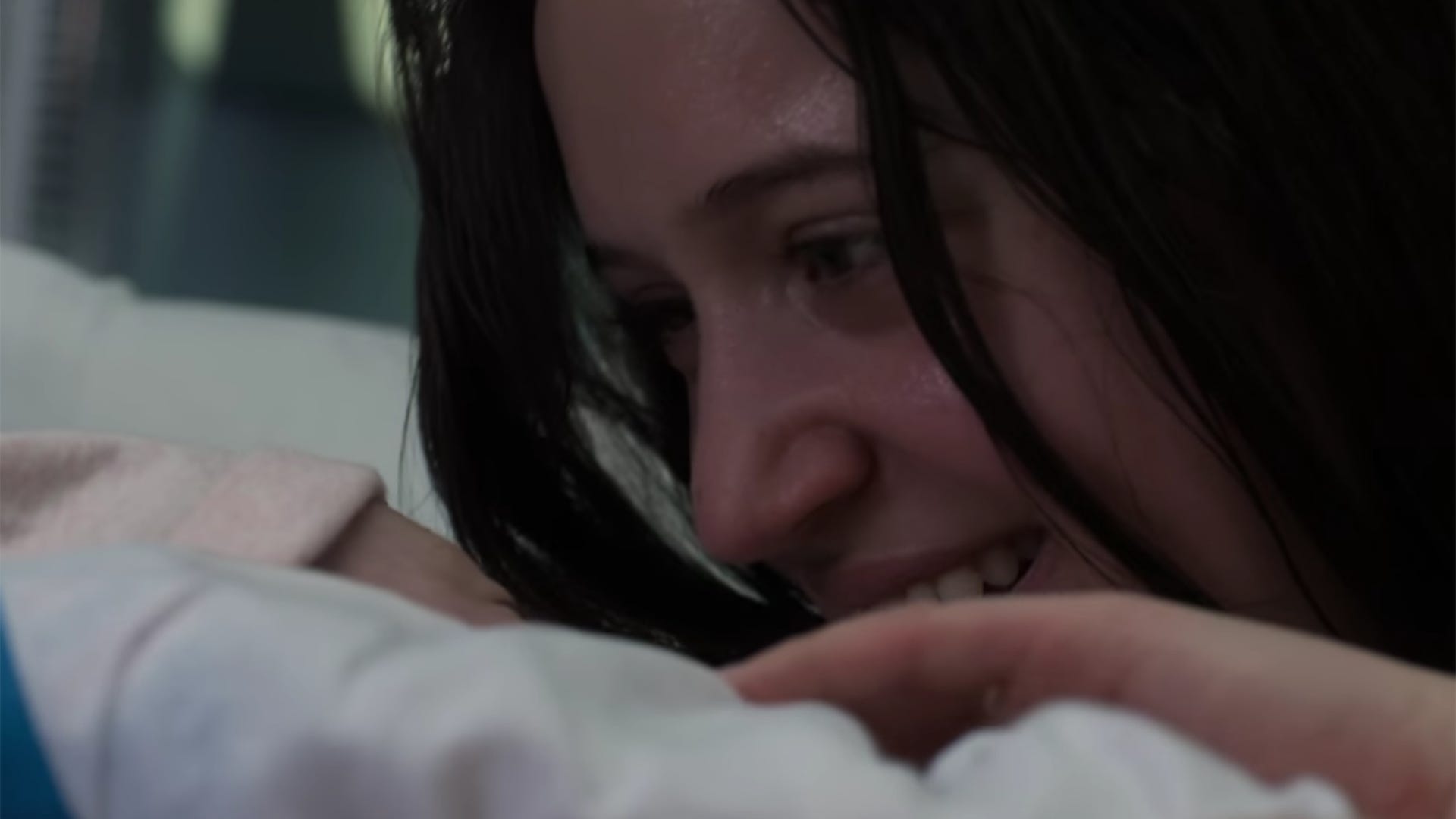
Religious themes, specifically Christian ones, play a huge part in this season. How much does religion play a part in the overarching mythology or is the show more about the larger existential questions and not specifically tied to any one religion?
Keyser: I don't think it's tied to a religious view necessarily. Although I think, in general, we look for something to believe in as humans beings. And I think these kids ... they're going to look for that too. And for some people that may become a source of comfort. It's also true that if things got worse, for example, often when things are particularly bad somebody with a religious message becomes powerful. And so it's certainly possible that over the course of the story of New Ham, someone, maybe Helena, maybe somebody else who proposes a different religious message, might become important in the whole conversation. ... It's a very early version of this society with very few questions answered. That can put people toward trying to come up with larger explanations that may turn to religious. It's not accidental that in the second episode people are worshiping in some ways the sun and praying to the sky and saying, "What did we do wrong?" And the eclipse seems to matter to them because in very many ways all of those things, including the eclipse, feel scary and ominous in a way that they don't' tend to do with us anymore because we have explanations for all those things. But these people, they're pushed back into a world in which they have very few explanations for anything. That's a long way of saying I don't think you can discount somebody with a message of faith and religion that might become important in pre-complex conversation that's goes on in New Ham.
Although gender dynamics are explored a lot in this season, race really doesn't factor in at all. Why did you choose not to directly address racial bias, and is this something you'd like to explore given a second season?
Keyser: I think we did in a couple of places. It's hinted at because we couldn't do everything at once and I think things come up. So I wouldn't bet against the fact that it will. But there are a number of times in which there is a reference to race. For example, in the fifth episode, Dewey talks about Allie and her black boyfriend, he makes a very specific reference to race. And Campbell in the last episode is very clearly using a thinly veiled racial slur against Will. So I would not bet against the idea that race and class and all of that stuff ends up mattering a lot.
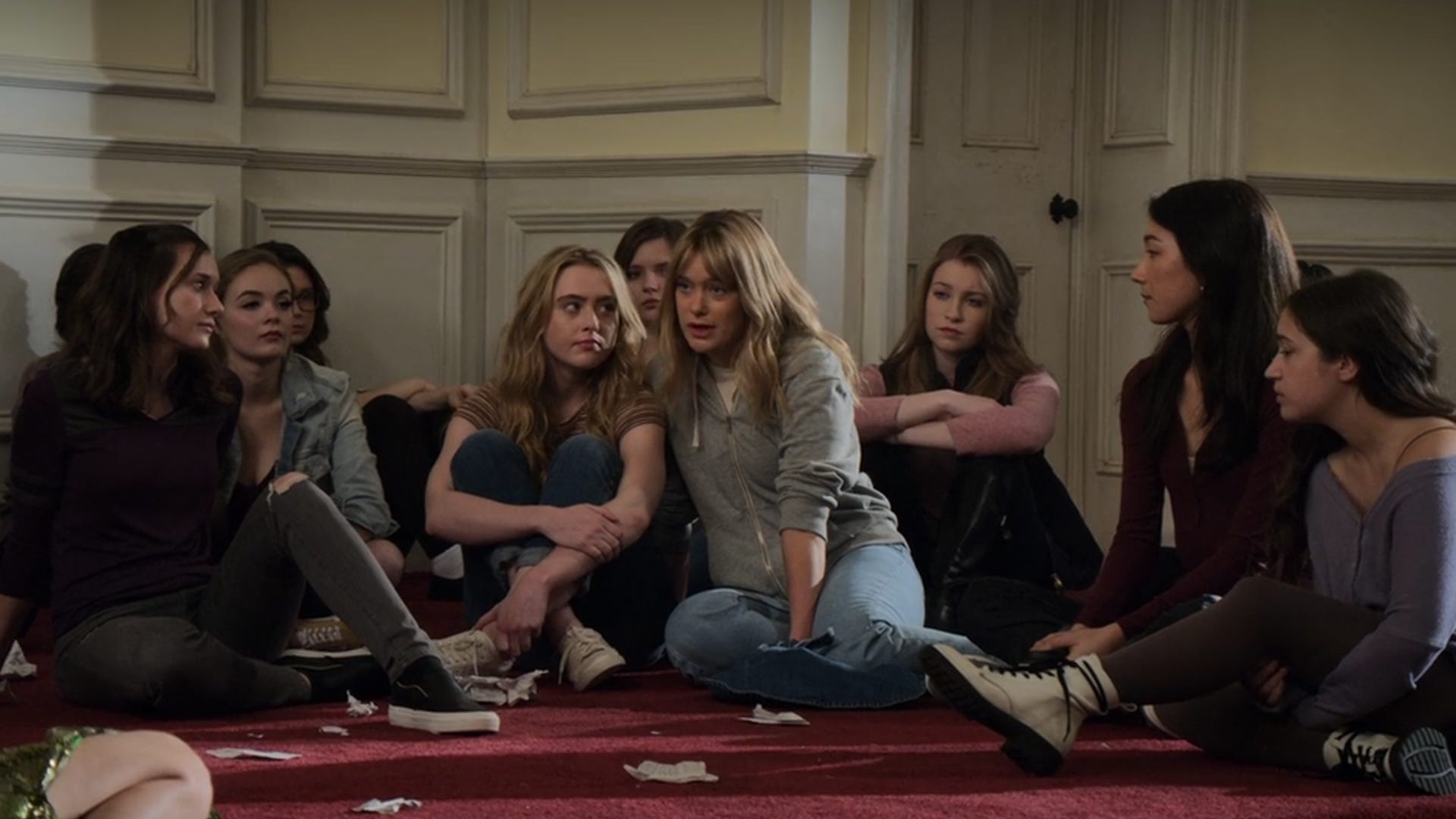
There are a lot of great references woven into this season, such as Rosencrantz and Guildenstern Are Dead. How much should we be reading into the symbolism and themes of these different texts that are referenced and quoted in the episodes?
Keyser: None of them are irrelevant. Whether they have lasting meaning beyond the ways in which they understand things in the moment [varies]. But Rosencrantz and Guildenstern, Cassandra and Harry have a conversation about that, about whether there is a kind of logic to the universe or not, to what extent fate plays a part or whether we're in control of our own destinies. Those things matter a lot to the residents of New Ham very much in that first episode and I think they'll matter to them all the way through. And I think that none of this stuff is thrown away. It's not meaningless. ... Let me say that those things are there for a purpose and Rosencrantz and Guildenstern certainly is in that very early episode.
Allie was convinced that Dewey (Seth Meriwether) didn't act alone when he murdered Cassandra. Is there a chance that he had a co-conspirator still or has that storyline been put to rest?
Keyser: I don't think that we're super focused on that right now. I hate to close off any mystery that has people wondering about things. ... It sometimes happens that you discover in stories that things come back around and things that you didn't intend to tell become things that are told, although we don't tend to tell stories that way. We're not throwing things up in the air and saying, "Well, what will we think of next?" So right now let me say this: I think it may always be somewhat unknowable. And the fact that you can't ever 100% know the truth of something when you're not there is part of the problem for all of us and it's a problem for them. So you have to think about the justice they did in all of this and the decisions they make about who to protect and who to punish; it's always coming with an asterisk because we don't know whether we truly understood exactly how anything happened. I don't think you're going to find that we're going to bring that up immediately again, but the fact that you don't know -- that no one ever describes the moment, that you can't absolutely prove it was Dewey and Dewey alone -- is relevant. There's no witness. It is on purpose that there isn't an eyewitness, for example, who eventually comes forward and says this is how it happened and this is who did and no one else did it. I think that matters a lot in the world, that we always operate on only partial information.

I love that we got to see the original world briefly in the finale. Are you planning on exploring things more from the parents' perspective going forward?
Keyser: Not much. It's not going to split 50/50, but I think we said to the audience that we can go back there if we want. And we have some thoughts about when we might, and so that is definitely possible that we will shift perspectives and show some moments in West Ham. You shouldn't expect that the season finale is going to turn [the show's] perspective into a split 50/50 or anything like that. We are super-duper, heavily focused on the citizens of New Ham and the world they make. But periodically it might be interesting to see how that parallels what happens to the world of their parents since they've been gone.
Speaking of parallels, we learned that Harry and Kelly's (Kristine Froseth) parents were having an affair. Was that reveal included just to further complicate Harry and Kelly's dynamic or will it play a role in things moving forward?
Keyser: Let me say this: One, it may be possible that there are complicated, interesting relationships between their parents that play into things that are going on in that town. Just as much so -- even more -- it's about the moral messiness, the mushiness of the world from which they came and the doubt about all the things they took to be certain. Neither one of them, whatever else they felt about their parents, would have thought that [their parents were having an affair]. So it is a little bit a part of the morass. And that's certainly relevant and it will be relevant again.
The Society is available to stream on Netflix.
PHOTOS: The Best Netflix Originals of 2019 So Far
